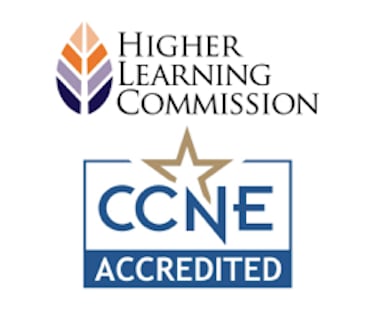RN to BSN Degree
Earn Your Nursing Degree in 14 Months¹
If you are a registered nurse (RN) with an associate degree or diploma certificate in nursing, Grand Canyon University’s Bachelor of Science in Nursing (RN to BSN) online program can prepare you for expanding professional roles in the healthcare system of tomorrow.2
- Complete your degree
Complete core nursing coursework in 14 months.1 - 5-week classes
With most classes being five weeks long, this helps you accelerate your degree completion. - 90 credits transfer
Our complimentary, unofficial Lopes Credit Evaluation service will help you estimate your GCU transfer credits.3
Obtaining your Bachelor of Science in Nursing can position you to broaden your understanding of best practices in nursing, prepare you for graduate study and equip you for leadership positions in which increasing levels of education are expected.
Gain Valuable Experience in Continuing Education for Nurses
In your BSN courses, you will receive instruction from practicing nurses in the field who will share their knowledge and experience in the areas of clinical patient care, healthcare management, professional development in nursing practice and leadership. You can gain valuable experience through hands-on and academic course curriculum that can be directly applied to a nursing job post-graduation.
Explore just a few of the many reasons to choose GCU’s accredited online RN to BSN program:4
This nursing program is tailored to meet the needs of the RN adult learner and to maximize the strengths that the working RN already possesses. Our university counselors provide an upfront time to completion, as long as you follow the schedule provided, and our degree program calculator tools provide you with a general estimation of the cost of attendance.
Residency Requirement: Undergraduate students must complete at least 30 semester credits of coursework in a Grand Canyon University program to satisfy residency requirements.
Upper Division Credit Requirement: For a baccalaureate degree, a student must earn a minimum of 36 semester credits in upper division (300 or above) courses.
Loading Form
Accredited and Respected Since 1968
The baccalaureate degree programs in nursing, the master’s degree programs in nursing, the Doctor of Nursing Practice programs and the post-graduate APRN certificate programs at Grand Canyon University are accredited by the Commission on Collegiate Nursing Education (https://www.ccneaccreditation.org).
GCU is also fully accredited by the Higher Learning Commission, an independent accrediting body that provides high educational standards for comprehensive institutional review.
For more information on the accreditation of nursing programs and other university licensures, please visit our College of Nursing and Health Care Accreditations page.

Affordable Professional Development for Nurses
This program at GCU has a competitive rate of tuition that is comparable to other popular online nursing options for students. Our goal is to provide a high-quality nursing education for current nurses at a cost that is affordable for all students.
GCU just lowered the price of our RN to BSN program by 30% to help make college more affordable.7
The RN to BSN program at GCU is ideal for busy adult learners, with a one-course-at-a-time design that allows you to continue working while earning your degree in as little as 14 months.1 Our program is different than competency-based programs; you won’t be required to take multiple courses simultaneously or proctored exams.
While completing your nursing education advancement,2 you’ll become a part of our online learning community at GCU. With this comes various resources and a dedicated counseling team to aid you in your online learning journey.

Career Paths With a BSN Degree
Nurses with a BSN may apply their advanced knowledge and skills to position themselves for possible career advancement, a variety of workplace options and the chance to grow and develop in a field they may find rewarding. This degree may be valuable for those seeking:
- Job Opportunities
According to a recent survey by the American Association of Colleges of Nursing, 77.4% of employers express a strong preference for BSN program graduates, while 40.6% of hospitals and other healthcare settings are requiring new hires to have a bachelor’s degree in nursing.6 - Career Advancement
The knowledge that you can gain in this program can prepare you for various jobs in the healthcare field. More and more clinical nursing positions require a nursing degree. Get ahead of the curve while opening doors to opportunities in nursing. - Workplace Options
Depending on your area of interest, you may be prepared to work in hospitals, ambulatory care centers, health service organizations or rehabilitative settings. Ultimately, what you are taught in this program can help you position yourself to pursue a career you are passionate about.

Higher Education for Registered Nurses FAQs
If you’re hoping to set yourself up for potential advancement in the nursing field by earning your bachelor’s degree, read through some frequently asked questions to learn more about this program.
If you’re looking to position yourself for possible advancement in the healthcare field by earning this degree, fill out the form on this page to get in contact with a university counselor.
1 The entire program requires 120 credits.
2 While all courses are completed online, you will need to attend clinical, practicum and immersion hours in person locally.
3 Service offered on business days only.
4 American Association of Colleges of Nursing. (n.d.). The impact of education on nursing practice. Retrieved April 2019.
5 Wolters Kluwer. (2022, Sept. 13). History of the ANCC magnet recognition program. Retrieved Oct. 2022.
6 American Association of Colleges of Nursing. (n.d.). Employment of new nurse graduates and employer preferences for baccalaureate-prepared nurses. Retrieved Oct. 2022.
7 Cannot be used in conjunction with other GCU scholarships or awards.
8 Arizona State Board of Nursing. (n.d.). Arizona NCLEX Pass Rates. Retrieved March 2023.
9 Niche. (n.d.). Grand Canyon University Rankings. Retrieved March 2024.
Course List
Core Courses
Course Description
This course is an introduction to the Core Competencies for Professional Nursing Education, the role of the professional nurse, and the importance of effective nursing leadership. Standards of practice, differentiated nursing practice, professional accountability, interprofessional collaboration, and quality improvement are emphasized with importance placed on the application of leadership styles and management skills.
Course Description
This course focuses on methods of health history taking, physical examination skills, and documentation. Students integrate assessment skills and clinical judgment/reasoning in identifying actual or potential health problems and needs across the life span. Health promotion strategies are incorporated to provide for the unique needs of the individual, ensuring person-centered care. The course emphasizes the importance of providing compassionate care dealing with diversity, equity, and inclusion. Students design plans of care based on evidence-based research and practice.
Course Description
This course focuses on the community as the patient taking into account varying cultures, spiritual values, geographic norms, and economic conditions. The course examines social determinants of health, including social, legal, and political variables impacting individual, community, and population health across the life span. Students use epidemiological data, functional health pattern assessments, and nursing theories to plan and intervene in areas of health promotion and disease prevention across the life span.
Course Description
This is an introductory course on concepts of statistics, emphasizing applications to health care professions. The course is designed to prepare learners to understand concepts of statistics and the appropriateness of statistical methods used in published research papers and a variety of settings. Areas of emphasis include an introduction to the statistical analysis concepts of variable/reliability factors; P values; experimental design; descriptive statistics, including mean, median, and mode; sampling methods; and power analysis.
Course Description
This writing-intensive course promotes the use of research findings as a basis for improving clinical practice. Quantitative and qualitative research methodologies are analyzed with an emphasis on the critical review of research studies and their application to clinical practice. Students develop evidence-based practice recommendations from the critical analysis of available literature guided by a PICOT question. Prerequisite: HLT-362V.
Course Description
This course introduces a Christian foundation for spiritual assessment and care with specific emphasis on biomedical ethical principles and ethical decision-making within health care. Students practice assessment and propose holistic interventions that take into account the dignity of the human person. These assessments and interventions contribute to the physical and spiritual well-being of individuals across the life span and the health-illness continuum.
Course Description
This course focuses on the methods and technologies used to acquire, process, and analyze patient data, emphasizing information and communication technologies that support the documentation of care and effective communication among health team members at all system levels. This course provides students with an understanding of the importance of professional and ethical standards pertaining to the regulation and security of health information.
Course Description
This course is designed to build upon existing knowledge of the pathophysiological processes of disease as they affect patients across the life span, recognizing the nurse's multidimensional role in health promotion and disease management and prevention, which include biological, environmental, social, psychological, and spiritual dimensions. Integration of nutritional and pharmacological concepts encourages critical thinking and application of nursing interventions. Prerequisite: NRS-420.
Course Description
This course integrates knowledge from pathophysiology, pharmacology, nursing theory, and current evidence-based practice to inform clinical judgment and to ensure safe, effective, and holistic care. The nursing process is applied to provide safe, quality care reflecting cultural humility across the life span. Particular attention is paid to interprofessional collaboration in the process of disease management and care coordination.
Course Description
The final course in the program is writing-intensive. It will integrate the academic and practical knowledge students have acquired throughout the program’s curriculum. Students participate in planned clinical experiences that refine professional competencies at the baccalaureate level and enable them to integrate new knowledge and enhanced skills to advance nursing practice. Clinical practice hours are dedicated to learning objectives in leadership and community health. The evidence-based project provides students an opportunity to identify a clinical nursing practice issue and propose a possible solution. Students, under the guidance of faculty and approved preceptors, identify and analyze a nurse practice issue, develop a change project, and propose an evidence-based solution that reflects synthesis and integration of course content and professional practice. The evidence-based project development is guided by the baccalaureate program learning outcomes. Clinical hours: 100. 50 hours in leadership and 50 hours in community health. Prerequisite: NRS-415, NRS-420, NRS-425, HLT-362V, NRS-445, PHI-413V, NRS-450, NRS-455, NRS-460.

Pursue a next-generation education with an online degree from Grand Canyon University. Earn your degree with convenience and flexibility with online courses that let you study anytime, anywhere.
* Please note that this list may contain programs and courses not presently offered, as availability may vary depending on class size, enrollment and other contributing factors. If you are interested in a program or course listed herein please first contact your University Counselor for the most current information regarding availability.
* Please refer to the Academic Catalog for more information. Programs or courses subject to change.
